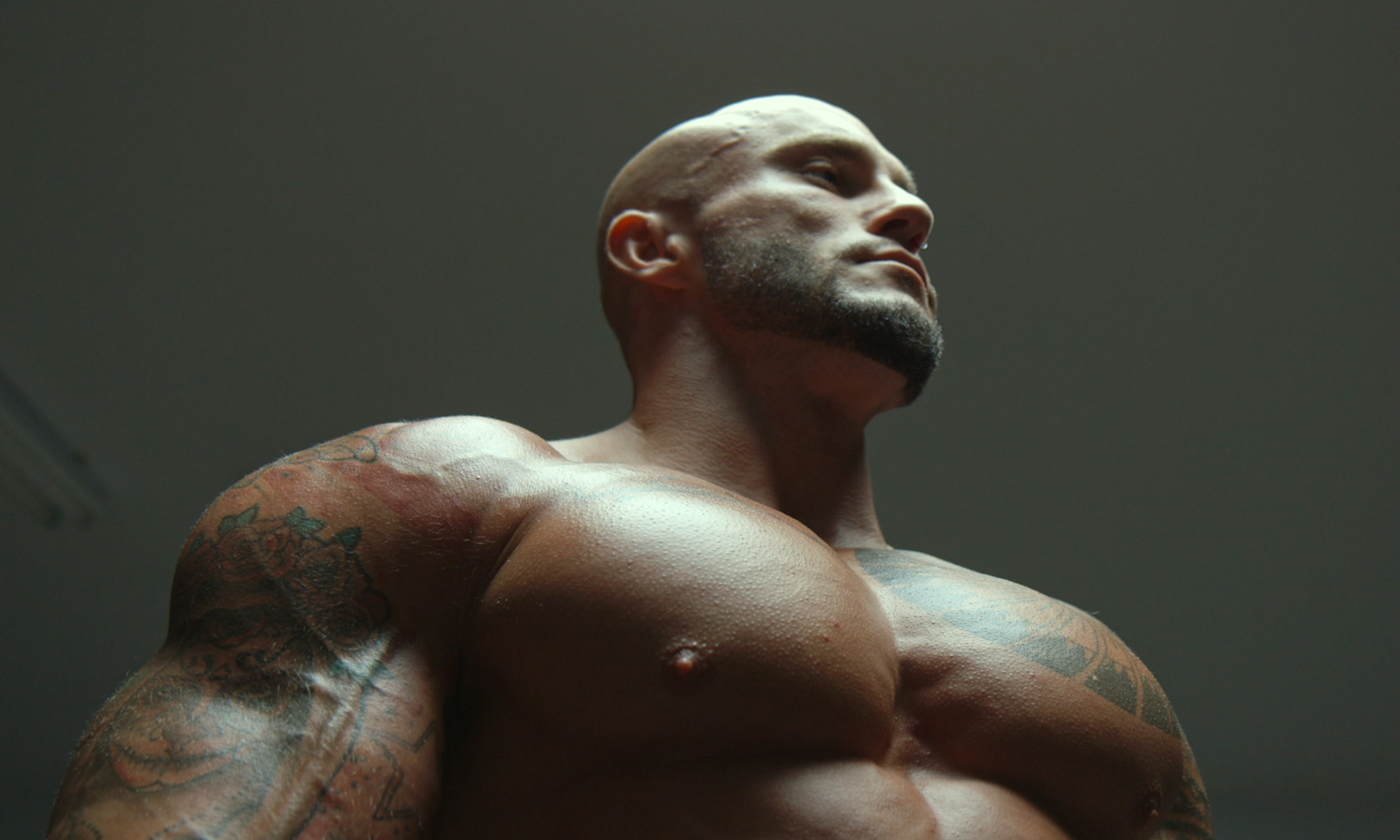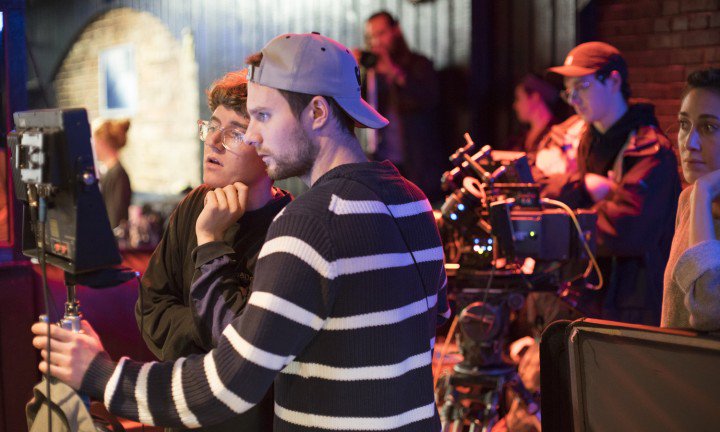Matt Embry takes audiences on an unexpectedly emotional journey in Living Proof. The Calgary-born filmmaker pulls double duty as the director and subject of this compelling film that uses his own diagnosis with multiple sclerosis to interrogate the recommendations and prescriptions that encourage people to lead healthy lives. After tackling the lives of numerous Canadians, most notably hockey player Theo Fleury in the acclaimed Theo Fleury: Playing with Fire, Embry puts himself before the camera with a personal quest that consistently moves and surprises. The film reveals the fallacies of Big Pharma and the prescription drugs that do little to yield a hopeful future, while Embry’s experience yields another story.
Living Proof offers a hopeful journey as Embry and his father, Dr. Ashton Embry, commit themselves to researching alternative efforts to treat this disease that has no known cause or cure. Using his personal quest to save his own life and those of others to come, Embry meets with doctors and other people living with MS to listen and learn about their experiences. The film also shows the director and his father on their tours sharing the message of Embry’s MS Hope, which advocates practical action plans, like the MS Best Bet Diet, that offer healthy alternatives to costly drugs and campaigns. As Embry’s efforts show the benefits of these alternatives compared to the paths chosen by others who aren’t as fortunate and experience the debilitating effects of the disease, Living Proof offers powerful and hopeful evidence for change. It’s an amazing story told with the kind of sincerity and conviction that should inspire action.
POV: Pat Mullen
ME: Matt Embry
This interview has been edited for brevity, clarity, and the removal of spoilers.
POV: Just to start by giving some perspective on your experience with MS, what information did you receive in the few weeks of your diagnosis? How quickly did you encounter the information gaps addresses in the film?
ME: When I was diagnosed, hope was one of the biggest strategies and that wasn’t something that my dad was interested in. At the time, didn’t know if the drugs were going to work or what the case was. He more or less immediately plunged into medical research at the University of Calgary.
POV: Can you talk about your relationship with your family? The film and your work shows that you’ve been very fortunate to have parents who are committed to helping but also have the backgrounds to be active participants in furthering research and keeping a healthy lifestyle. How has this journey been together?
ME: I was fortunate to grow up in a tight knit family. My dad and I are very close. It was devastating to me when I was diagnosed, so, as a parent, I can’t imagine how devastating it would be to have a child diagnosed with a debilitating disease with so many unknowns. It’s been phenomenal to watch commitment to the research for me and for other MS patients. His house is literally full of stacks of journals and papers—he has his own little library there and MS is something that he continues to research.
POV: You’ve made films about other subjects, but what was it like putting yourself before the camera?
ME: I’ve been fortunate to have a career in Canada as a documentary filmmaker. I’ve directed films on Jann Arden, Theo Fleury, and Ian Tyson, so over the years, I’ve been aware of what it takes for a subject of a documentary to take that leap and allow the cameras in. The advantage I had was that I knew my director of photography, Patrick McLaughlin, very well and I was also personal friends with our sound operator Adam Naugler, so I was friends with the crew prior to making the choice to open my life and let the cameras in.
Directing also gives an understanding of what granting “access” means. It’s not an easy thing to do, but I knew the more I opened my life to the harder scenes and moments, the more viewers could get a true sense of what was going on. There are some intimate scenes in the film in which we didn’t have camera operators in the room.
POV: What are some of those scenes? Looking back, I wouldn’t be able to tell which scenes are set up this way.
ME: There’s a scene in particular where I’m meeting with my counsellor. We knew that getting access to a closed-door moment like that would be challenging in terms of getting the emotional reality of the scene. The relationship between a counsellor and a patient is intimate. A third body in a room can be problematic for that—I’ve experienced this when shooting the other documentaries I’ve made. That scene was a case where my director of photography had to go in, set up cameras prior to, and then leave the room and let it roll.
POV: That’s interesting. And in terms of access, how did you choose your other subjects in the film? We get a good range of subject with different stages of MS and different experiences.
ME: It was a combination of outreach and patients reaching out to us. My father and I were doing a tour to help people and share the message of MS Hope. In that journey, we were able to meet patients with MS who became our subjects and people came out of the woodwork by reaching out on Facebook and social media. Their stories became very compelling and we wanted to share their journeys.
POV: And what was it like going on these journeys with fellow patients?
ME: From a personal point of view, when you see what the disease can do to people, it can be very frightening. You have emotions of fear as well as sadness and sorrow when you see people struggling and how it effects their families. I didn’t realize the film would be as emotional as it was.
POV: As the director and subject, what sorts of precautions did you keep in mind while depicting the experience of having MS?
ME: It was important to try to allow viewers to understand what it feels like to be diagnosed with something. Whatever kind of illness—MS, Parkinson’s, lupus, cancer—that you’re confronted with, the world that you see as normal is shaken. Then it becomes a process of trying to find answers. You look for patients. You look for doctors. You go on a quest. In the film, MS is the flashpoint and the illness that we focus on, but I really tried to convey the emotional journey that someone goes on when they are diagnosed. Here are the lengths they go to in their quests for hope and answers.
POV: I really like that structure to the film. After seeing the film, I did a little quest of my own to compare the strategies that you promote through MS Hope, like the MS Best Bet diet, with the activities of the MS Society of Canada. I was shocked when I saw their “Burgers to Beat MS” campaign and a lot of other fast-food campaigns, like poutine, that are counterintuitive to your father’s research, not to mention most health and nutritional research in general.
ME: With the MS Society of Canada, I take issue with the fact that they partner with A&W to raise money. Their current concept is that burgers beat MS. From our point of view, burgers don’t beat MS. They make it worse. These foods are high in dairy, gluten, saturated fats, and salt. It’s very upsetting to us that the MS Society of Canada promotes and aligns itself with fast food companies that we don’t believe are in the best interests of MS patients. Obviously, the argument is that they are using these campaigns to make money. We see it the same way as the Heart and Stroke foundation having cigarette sales to raise money.
POV: It seems like an endless cycle.
ME: Exactly. It’s a big problem.
POV: Living Proof reminded me a lot of Léa Pool’s film Pink Ribbons, Inc., which is about breast cancer campaigns being more of a branding tool than a quest for knowledge and tool for research; like a campaign where you buy some yoghurt and ten cents from every container goes to breast cancer research. But by the time you spend a buck to mail in the label and they process it, little of that dime goes to research. More and more, corporatization and philanthropy are going hand in hand. Can this be productive?
ME: It’s a great thing to be able to raise money, but the question is with which corporations? For something like the MS Society of Canada, I don’t understand why they’re partnering with fast food companies when they could be partnering with a company that sells fruits and vegetables or promotes a healthy active lifestyle for people with the disease and, as importantly from a preventative point of view, for people who don’t have the disease. In this film, we’re trying to tackle this issue. This same problem is likely going on for other diseases where we don’t know the cause or don’t know the cure. There are all these expensive drugs surrounding the disease, but don’t necessarily seem to have any long-term effect on the progression of these diseases. At the same time, when it comes to corporate partnerships with charities, I encourage that.
POV: And on that line, where does MS Hope receive its support to share its message?
ME: I run my own production company, so I make the videos. When it comes to speaking tours, we work with my dad’s charity Direct MS.
POV: Right. The film shows that work.
ME: And in that charity, 95% of funds go to research. Then the rest of it, the phone calls, talking to patients, that’s all volunteer. I also refuse to take speaking fees.
POV: That is very generous. Another doctor in the film, Dr. Walls, makes an important comment in the film where she says, “This prescription that it is all downhill is not correct.” As a filmmaker and as a subject, what is some of the advice you would provide in terms of furthering the positive and hopeful outlook that Living Proof depicts?
ME: I really like that quote and the takeaway for viewers, whether they have MS or not, is that they have to take personal accountability with their health. They have to go out there and start asking questions, find other patients, and pursue other doctors and information. Luckily with the internet, there is far more information that they can access. The film offers real world solutions like controlling what you eat or controlling your daily exercise. There’s hope by taking that diagnosis and saying, “I can take control of this. It’s not going to get the best of me.”
Learn more about MS Hope at MSHope.com.










